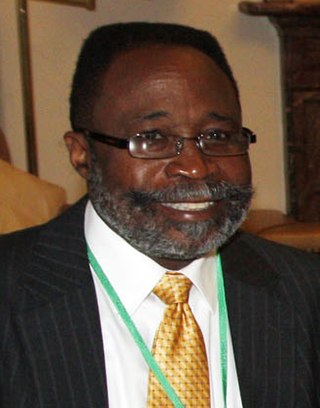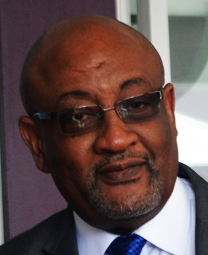
Daniel Orlando Smith, OBE is a British Virgin Islands politician and the former Premier of the British Virgin Islands from 2011 to 2019 and from 2003 to 2007. He also formerly served as Chief Minister of the British Virgin Islands from 2003 to 2007. He first won the office when his National Democratic Party won the 2003 general election, being the party's first victory at a general election in its history.

Elections in the British Virgin Islands are conducted to elect members to the House of Assembly. In the British Virgin Islands elections are not conducted in relation to appointments to either the Executive or Judicial branches of Government, and there are no other publicly elected posts in the British Virgin Islands. Most elections are conducted as general elections, which under the Constitution are required to be held every four years, or as by-elections when a member of the House of Assembly dies or steps down. Since the re-introduction of democracy into the British Virgin Islands in 1950 there have been fifteen general elections, and three recorded by-elections. The last election was held on 25 February 2019.
The Virgin Islands Party (VIP) is a political party in the British Virgin Islands. It is presently led by Natalio Wheatley. It is the oldest active political party in the British Virgin Islands, and it has won more general elections (seven) than any other political party in the British Virgin Islands.
The United Party was a political party of the British Virgin Islands.

The Premier of the Virgin Islands is the head of government for the British Virgin Islands. As a British Overseas Territory, the Premier is appointed by the Governor on behalf of the British monarch, currently King Charles III. Until 2007, the head of government was known as the Chief Minister of the Virgin Islands, but a constitutional change in 2007 renamed the position as Premier.

Politics of the British Virgin Islands takes place in a framework of a parliamentary representative democratic dependency, whereby the Premier is the head of government, and of a multi-party system. The British Virgin Islands are an internally self-governing overseas territory of the United Kingdom. The United Nations Committee on Decolonization includes the islands on the United Nations list of non-self-governing territories. The Constitution of the Islands was introduced in 1971 and amended in 1979, 1982, 1991, 1994, 2000 and 2007. Executive power is exercised by the government. Legislative power is vested in both the government and the House of Assembly. The Judiciary is independent of the executive and the legislature. Military defence is the responsibility of the United Kingdom.
Snap general elections were held in the British Virgin Islands on 17 November 1986. The result was a victory for the Virgin Islands Party (VIP) led by Chief Minister Lavity Stoutt over the United Party (UP). Subsequent to the election, Ralph T. O'Neal became leader of the opposition despite not being head of the UP.
General elections were held in the British Virgin Islands on 12 November 1979. The result was a victory for the opposition Virgin Islands Party (VIP) led by former Chief Minister Lavity Stoutt over the incumbent United Party (UP) led by Willard Wheatley. The newly formed Virgin Islands National Movement (VINM), led by Elvin Stoutt, also contested the elections but did not win any seats.
General elections were held in the British Virgin Islands on 1 September 1975. The result was one of the most confused in the Territory's history, but is officially recorded as a victory for the United Party led by Willard Wheatley over the opposition Virgin Islands Party (VIP) led by former Chief Minister Lavity Stoutt.
General elections were held in the British Virgin Islands on 2 June 1971. The result was a victory for a coalition of the VI Democratic Party (DP) together with independent candidate Willard Wheatley over the newly formed Virgin Islands Party (VIP) led by former Chief Minister Lavity Stoutt, and incumbent BVI United Party (UP) led by Conrad Maduro.

Julian Fraser is a British Virgin Islander politician who formerly belonged to the opposition Virgin Islands Party in the British Virgin Islands, and in August 2018 formed a new party, Progressives United.
General elections were held in the British Virgin Islands on 8 June 2015 to elect members to the House of Assembly. The result was a landslide victory for the incumbent National Democratic Party (NDP) over the opposition Virgin Islands Party (VIP). No minor parties or independent candidates won any seats. Unusually, every single incumbent candidate who stood in their original seat was victorious.
General elections were held in the British Virgin Islands on 14 April 1967. The election was the first general election after the passing of the new Constitution earlier in the same year, which introduced Ministerial Government into the British Virgin Islands for the first time. Elections under the prior Constitution introduced in 1950 to restore the Legislative Council had merely elected legislators. It is probably fair to say that 1967 marked the introduction of true direct democratic rule in the British Virgin Islands. But, notwithstanding the introduction of Ministerial Government, the resulting Legislative Council is still referred to as the 6th Legislative Council in deference to the five prior Councils elected under the 1950 Constitution.
Conrad Antonio Maduro is a British Virgin Islander politician and longtime leader of the United Party. Remarkably, Conrad Maduro has led his party to victory at three different general elections, but has never been appointed Chief Minister.

General elections were held in the British Virgin Islands on 28 November 1963 for seats on the Legislative Council of the British Virgin Islands.
Dr Qwominer William Osborne, OBE was a British Virgin Islander politician and physician.

The Leader of the Opposition is the leader of the largest political party in the House of Assembly that is not in government.

Isaac Glanville Fonseca was a British Virgin Islands political figure around the time of the restoration of democracy in 1950. Fonseca was one of the community leaders who participated in the "march of 1949" and later went on to become one of the longest serving legislators in the British Virgin Islands, winning a total of six general elections before retiring from politics.

General elections were held in the British Virgin Islands on 25 February 2019. For the first time, four parties with at least one incumbent member were contesting an election.

General elections were held in the British Virgin Islands on 24 April 2023. The governing Virgin Islands Party (VIP) remained the largest party in the House of Assembly but lost its majority resulting in a hung parliament.






